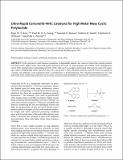Ultrarapid cerium(III)–NHC catalysts for high molar mass cyclic polylactide
Abstract
Cyclic polyesters could improve the properties of degradable plastics, but routes to them that provide a product with faster rates, higher molar mass, and greater selectivity for cyclic vs linear polymer are needed. Here, homogeneous Ce(III)–N-heterocyclic carbene (NHC) catalysts show outstanding activities (turn-over-frequency (TOF) > 864 000 h–1), excellent control, and selectivity for cyclic polylactide (PLA) topology (>95%), yielding high molar mass PLA (60 < Mn < 250 kg mol–1). They efficiently produce cyclic PLA from rac-lactide or l-lactide and aliphatic cyclic polyesters from ε-caprolactone or β-butyrolactone. The enhanced performances are only achievable from combining cooperative Lewis acidic cerium(III) and hemilabile N-heterocyclic carbene functionalities.
Citation
Kerr , R W F , Ewing , P , Raman , S K , Smith , A D , Williams , C K & Arnold , P L 2021 , ' Ultrarapid cerium(III)–NHC catalysts for high molar mass cyclic polylactide ' , ACS Catalysis , vol. 11 , pp. 1563-1569 . https://doi.org/10.1021/acscatal.0c04858
Publication
ACS Catalysis
Status
Peer reviewed
ISSN
2155-5435Type
Journal article
Description
The EPSRC are acknowledged for research funding through the Centre for Doctoral Training in Critical Resource Catalysis (CRITICAT, EP/ L016419/1, R. W. F. K., P. M. D. A. E.), EP/J018139/1, the UK Catalysis Hub (EP/K014714/1, P. L. A., C. K. W., S. K. R.), EP/M010554/1 (P. L. A.) and EP/S018603/1 (C. K. W.). This project has received funding from the European Research Council (ERC) under the European Union’s Horizon 2020 research and innovation programme (grant agreement No 740311, P.L.A.).Collections
Items in the St Andrews Research Repository are protected by copyright, with all rights reserved, unless otherwise indicated.

